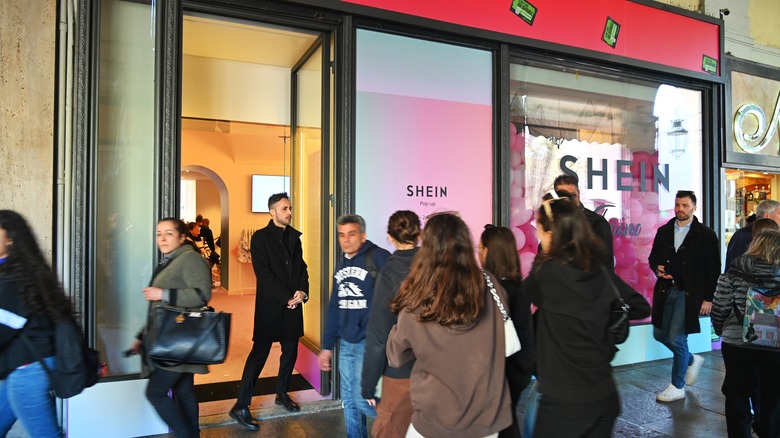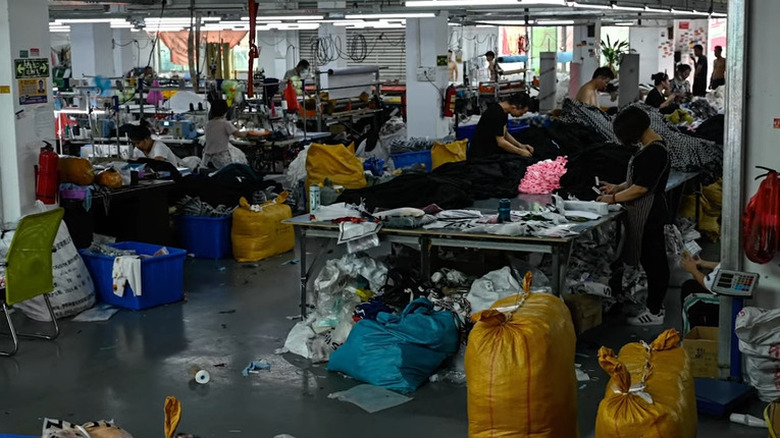The Shein Influencer Trip Controversy, Explained
As much fun as fashion and clothing styles can be, it's important to be aware of how detrimental fashion has been to the environment — especially with the rise of Fast Fashion. Brands like H&M, Zara, and Shein offer stylish, cheaply made clothing from unsustainable materials that are worn less and thrown out more, leading to an estimated 85 percent of textiles ending up in landfills annually. Clothing production is horrible for the environment, from using excessive amounts of water, to causing 10 percent of humanity's carbon emissions, to polluting water with dyes and harmful microplastics. That's bad enough without considering unethical and exploitative working conditions in factories, as less than 2 percent of the 75 million people working for fast fashion worldwide can make a living wage.
Shein is one company that has faced many of these accusations. In addition to claims of copyright violation for making cheap renditions of high-end designs, Shein has recently faced scathing reports of exploitation at their factories. In the last two years, news outlets like Wired, UK's Channel 4, Time, and Reuters have investigated the conditions at their 6,000 factories across China, with horrific results. While the company admitted to some charges and denied or evaded others, its recent strategy has been to pay a select number of influencers to tour a Shein factory and report how lovely and clean it is. Now those influencers are facing backlash from consumers who see right through Shein's propaganda.
What were the criticisms against Shein?
Shein (pronounced "she-in"), founded in 2008 in Nanjing, China, has become one of the world's most popular fashion brands in 2022, surpassing even Zara and Macy's in online sales. It employs nearly 10,000 people in China, Singapore, and the United States, with most of its factories in Guangzhou, China. But the company is now trying to rebuild its image after reports of unsustainable, environmentally detrimental production and harmful labor practices.
Despite the fashion industry's commitment to reduce carbon emissions by 2030, Shein was found to produce about 6.3 million tons of carbon dioxide annually, the same as about 180 coal-fired power plants. Its clothing was reportedly dangerous to workers and consumers too, as children's clothes failed flammability requirements and were found to contain lead. Reports in 2021 and 2022 discovered poor working conditions, from untidy factories causing fire hazards and missing basic safety protocols like windows and emergency exits, to overly long shifts for little money. Some employees worked 75 hours a week, with only one day off a month, while earning as little as four cents per item. Two factories required 18-hour days, for two cents per item. Many worked without contracts, and their already low base salaries were docked if they made mistakes. Given how many of these points violate China's labor laws, it's perhaps not surprising that the company would try to use social media influencers — the company's primary source of advertising — to improve Shein's standing.
Who went on the Shein Influencer trip?
It's not news that Shein works with social media fashion influencers to promote their brand, as any number of "haul" videos on YouTube, TikTok, and Instagram can attest. Young influencers helped the company cheaply promote their products to their primary demographic (teens and Gen-Z), and their partnership with thousands of influencers helped the company go from $10 billion in sales in 2020 to a staggering $100 billion just two years later. But there seems to be a reckoning now, as some influencers are cutting ties with fast fashion companies over criticisms similar to the ones Shein is facing. The influencers Shein invited on this recent tour are coming under fire for helping spread the company's "propaganda."
The company invited six American influencers, Dani Carbonari, Destene Sudduth, Aujene, Fernanda Stephany Campuzano, Kenya Freeman, and Marina Saavedra, to visit their "Innovation Factory" in Guangzhou, China. Following the trip, they all posted positive videos and comments about the facility and the working conditions there, mostly without mentioning the accusations of poor conditions, with some accusing them of following a script. "Like many others, I've heard a lot of misinformation," Saavedra said in her TikTok video (which has since been taken down). They showed a clean, brightly lit factory with automated machines and smiling workers, while they spoke of progress and positive changes. But online audiences weren't buying it. They all have received backlash online, with Carbonari, who called herself an "investigative journalist," particularly receiving several harsh comments and losing some 200 of her nearly 500,000 Instagram followers in a few days. (Her original Shein video has also been taken down, but a copy is making the rounds on Twitter.)
What are critics saying about the Shein influencer trip?
People were surprised by the influencers' glowing posts, given the accusations against Shein. "They took her to the model unit equivalent of the sweatshops," one commenter tweeted, causing Dani Carbonari's now-deleted Instagram video to go viral. Users flooded Carbonari's other posts with critical comments, such as "Other qualities include greenwashing for cash." One Twitter user said, "The fact SHEIN even did a press trip with influencers to one of its factories is a red flag."
Many talked about who Shein chose to send on the trip, with one tweeting, "They only invited people with zero critical thinking, eating this propaganda up!" Others pointed out that they specifically chose marginalized influencers. "Yall aren't going to like this, but Shein chose women that they thought would be desperate enough for the perks," one tweeted. "Notice there are no thin White women here; it's a non-verbal messaging that this s*** is beneath them." Another agreed, also reminding people that "THE WOMEN MAKING THE CLOTHES ARE THE MOST MARGINALIZED." Another, referring to Carbonari calling herself an "investigative journalist," posted "meanwhile actual investigative journalists & shein factory workers risked everything to film the reality of the workplace conditions."
Carbonari tried to defend herself in a since-deleted TikTok, saying she knew exactly what she was doing. "I was not paid for any trip or to say anything," she said (via Twitter). But another Twitter user set her straight, saying "A 'free' trip is payment. The trip isn't free, it's a barter system for good coverage. Investigative journalism isn't a cute phrase. It's real work."

